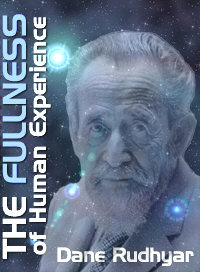 |
| Home | Bio | Art | Music | Literature | Civilization & Culture | Philosophy of Wholeness | Theosophy & Spirituality | Astrology |

CHAPTER FIVE
The Three Factors in Experience and Their Cyclic Transformation - 1 Subjectivity and desire In the preceding chapter the factor of subjectivity was shown to result from a condensation of the Wholeness of an organized whole whose attention had been aroused by a developing situation. This whole is organized, in the sense that it is based on and structured by a particular value and quality of the cyclically and symmetrically unfolding relationship between the principles of Unity and Multiplicity. This whole thus operates as one of the many manifestations of a particular and definable phase of the Movement of Wholeness. A great number of such manifestations occur because during the half-cycle when the state of being assumes the character of an objective universe, the drive toward self-multiplication and differentiation dominates all situations. These existential situations take place at several basic levels of operation. The most primary level is the one which human beings interpret and relate to as "matter"; and the concept of materiality refers to a type of motion structured by patterns of interatomic and molecular activity. The next level is that of biological organization and organic function to which the ambiguous name "life" is given. At the level of strictly human situations, the state of personhood is gradually unfolding a set of far-reaching and radically transformative potentialities. These become actualized within the field of societal systems in which a powerful and compelling collective psychism develops. Cultures are formed, mature, and disintegrate. Each level of organization activates a particular aspect of Wholeness, and consciousness is an inherent component of Wholeness. In any whole operating as part of a functionally effective larger planetary or cosmic system, a particular type of consciousness is at least latent. Consciousness passes from the state of latency, or of only diffuse presence, to that of focalized operation when a situation with which the whole is not conversant arouses its attention.(1) What I call the subjective factor in an experience expresses itself as a positive or negative desire for the experience. The term desire, however, should be given a meaning much broader than its common use, even in psychology and religious philosophy. As I stated in Rhythm of Wholeness (chapter Eight, p. 155), the word kama (desire) originally referred to the great Kama Deva, the first of the gods because he represented the divine desire to be, which led to the creation of a new world. In early Greek mythology, Eros was also the primordial god in whom this supreme desire was activated. I have interpreted such a desire as the infinite Compassion of the Godhead — the highest, most sublime manifestation of the subjective factor in any experience. This subjective factor nevertheless operates in any experience and at all levels of being, even if we do not use the term desire to refer to the subjective factor. At the level of matter, this subjective factor operates in elemental modes of activity we perceive as atomic and molecular attraction and repulsion. In living organisms, desire has a functional organic character, where will manifests as instinct. But as the new relationship between an ascending trend toward Unity and a slowly retreating principle of Multiplicity makes possible and increasingly stresses characteristically human situations, a new type of desire gives an unprecedented character to the subjective factor in the experiences: that of an ego. The ego, however, is not only a subjective factor, for its aim is to make a newborn and growing human organism as comfortable as it can be, and to satisfy its biopsychic desires as much as possible within the family and social environment in which it has been born. The ego is therefore a kind of compromise between what the innate biological temperament of a growing child and adolescent needs, and perhaps even more wants, in order to actualize its full potential of being, and what family traditions, religion, culture, and a particular kind of interpersonal relationship often relentlessly demand. Yet the ego should not be considered only a composite aggregation of habits, characteristic reactions, and more or less rigid patterns of feeling; it is also the first manifestation at the human level of the subjective factor in the process of experiencing any situation. This human type of subjectivity has the already mentioned capacity to detach itself from the experience. Because it has become a detachable factor, subjectivity assumes an at least relatively exterior character with regard to the whole situation the human organism is facing. The subjective factor that was inherent in all material, cosmic, or biological situations before the appearance of homo sapiens in the earth's biosphere becomes the subject "having" the experience. The difference is crucial and I believe it cannot be adequately understood unless it is given meaning with reference to the long period of the Movement of Wholeness representing the entire evolution of mankind, and to the function and purpose this evolution fulfills in the entire cycle. When the subjective factor in an experience assumes that it is the subject of the experience, what is experienced becomes the object being experienced. Once the dualism of subject and object is definitely and unquestionably established as the "reality" of the human situation, a great variety of consequences follow. They characterize conscious behavior, personal feelings, and the way in which the subject refers and relates to the biological organism he or she calls "his" or "her" body. As the new attitude toward experiencing is defined, interpreted, and formalized by the mind factor, the subject speaks of "his" or "her" mind. This mind has come to confuse the evolutionary state of personhood with the experiencing subject The state of personhood is a stage in the cyclic unfoldment of the Movement of Wholeness. So are matter and life — matter as a stabilized condition of energy, and life as a type of material organization able to maintain, expand, and somewhat modify the scope of its activity through replication and sexual procreation. Personhood, however, has a crucial significance because in both its essential and ultimate meanings it represents the concrete actualization of the Solution which the Godhead envisioned during the symbolic Midnight phase of the great cycle of being. This Solution, then only a potentiality, is now totally infused with and dynamized by Compassion. Personhood should likewise be permeated and radiant with at least the reflection of this divine Compassion. It is so pervaded when it manifests as the Supreme Person who appears on this earth at the "bottom" of the cycle (the Symbolic Noon). Personhood is also filled with the same divine Compassion when individualized persons, who have become "perfect" through the metamorphic process often called the Path, in their togetherness constitute the Pleroma — the seed and foundation of a series of states of quasi-divine radiance. Though beyond personhood, these can only be attained through personhood. No step can ever be missed. Personhood is a stage of the cyclic process of being during which human situations are to be experienced. But these situations should be experienced with the whole of the experiencing being, and not with a being divided into subject and object More significant still, in a realistic sense, is the similar division into a wielder of power and the power being wielded. The body is useable power; it is energy condensed into material (molecular and organic) structures, each of which has its function in the organismic whole. That energy has to be liberated into acts through muscles or through mental processes. Desire is the liberator, but the process of liberation depends not only upon the will which focuses the desire (as a lens focuses diffuse sunlight) but first of all upon mind. Mind is the technician that provides effective procedures enabling the subjective factor in the experience to relate to and act upon an available and adequate source of power at whatever level of operation is needed. Desire and the will it mobilizes are ineffectual if operating alone. The activity of mind has to be included in the process. However, if the desire-projecting subjective factor assumes that it is essentially exterior to the situation which could fulfill the desire, it has to depend upon mind and its techniques in a way which not only distorts or vitiates the direct spontaneous release of the needed power but also gives intellectual and analytical procedures a compelling authority. Sooner or later the entire situation takes on a disharmonic character. The subject may be deeply frustrated by his or her experience, just because he or she believes it is "his" or "hers." No experience can ever be full if it is "had" by a subject essentially exterior to the experience. 1. lf there is no arousal of attention we speak of partial or total in difference. A particular type of indifference has been called "spiritual" because it refers to the non-operation and transcendence of the kind of desires related to the ego. Return By permission of Leyla Rudhyar Hill Copyright © 1986 by Leyla Rudhyar Hill All Rights Reserved.  Web design and all data, text and graphics appearing on this site are protected by US and International Copyright and are not to be reproduced, distributed, circulated, offered for sale, or given away, in any form, by any means, electronic or conventional. See Notices for full copyright statement and conditions of use. Web design copyright © 2000-2004 by Michael R. Meyer. All Rights Reserved. |
 |
